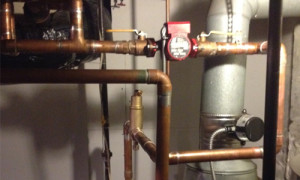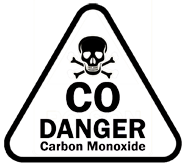I sometimes encounter customers that have hot water heating systems with radiators on the third floor that heat up poorly. Do you have a home that has a third-floor level with radiators that stay cold or partially heat up? This is a common problem in homes or apartment buildings with more than two stories. Find out what can be a simple fix for this problem.
Circulator…
A circulator ( or pump) on your hot water heating boiler has one purpose: to circulate the water throughout your heating system. Most boilers currently installed in homes today have a circulator installed on the return side of the boiler. The return piping in a hot water heating system brings the water back to the boiler so it can constantly be heated and recirculated back into the heating system.
Proper circulator location

The correct location for a circulator installed on a closed hot water heating system is the supply side of the boiler, not the return side. What is the proper circulator location in a closed hot water heating system? Proper location means that the circulator “pumps away” from the boiler, not back to the boiler.
Filling up with the correct PSI
Another common mistake I see from other heating contractors and plumbers installing new boilers or servicing them is that they didn’t bother to calculate how much system pressure is needed. For example say a home or building has a total of twenty four feet in height from the top of the boiler to the highest radiator. A total of 12 PSI of water pressure is necessary to fill up everything. And depending on the circulator installed on the boiler the additional pressure differential from the circulator will also add in if it’s on the supply side on the supply side of the boiler. For a more on this see the Slant/Fin building height and hot water system pressure.
The compression tank
If the system needs more than 12 PSI the compression tank will need the same air pressure just like a thermal expansion tank in a closed domestic potable water system otherwise the relief valve is going to drip and leak out the pressure that was added.
Benefits from pumping away
When the circulator turns on and is moving the water away from the boiler, the pressure differential it develops will increase the system’s static pressure. When the static pressure is increased in the heating system the operation of higher radiators is improved tremendously. The results from pumping away are:
- prevention of high-temperature water flashing into steam
- elimination of air bubbles
- airless system
- no gurgling or sloshing noises
- no circulator cavitation
- no pump problems
- radiators three stories or more will heat up
What can you do?
If you have cold radiators on the third floor and hear gurgling and sloshing noise throughout your radiators at bedtime, a simple inspection will help you sleep better and stay warmer on those cold nights. Click to schedule a boiler inspection.


